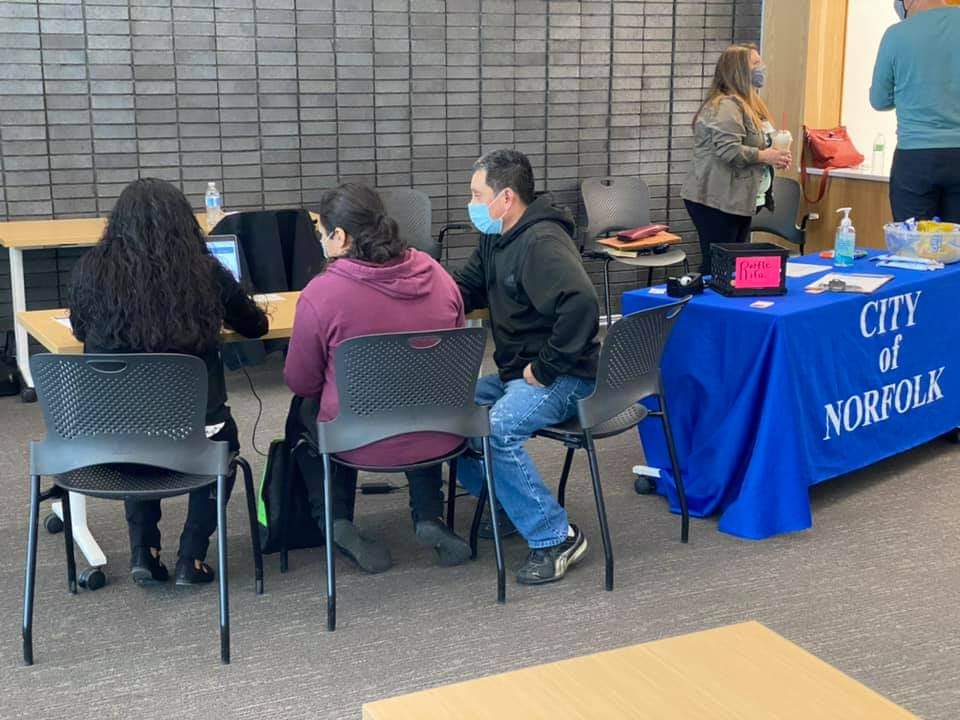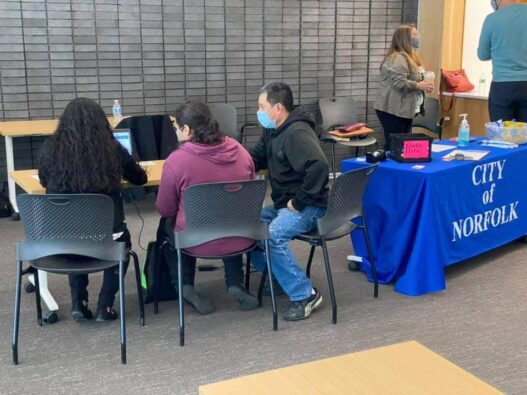It’s Okay to Ask for Help

I recently met with Norfolk Area United Way’s Candace Allan and Leonor Fuhrer over Zoom. I’ve had the privilege to get to know them just a bit over the past year, even if only virtually.
Their story is repeated often throughout our region: It’s a story of community leaders stepping into extremely challenging situations and finding solutions that work. It’s the story of community champions who may not want to be called heroes or leaders, who choose to serve their communities and fight for equity and access to services every day.

The challenges from COVID-19
My initial meeting with Candace, Norfolk Area United Way’s executive director, was also over Zoom in the late spring of 2020. At the time, the Midwest Early Recovery team was considering funding for communities in Nebraska that were in ongoing recovery from the 2019 Nebraska Flood.
Because of Norfolk’s proximity to meat-packing plants, the area is home to a large immigrant population that worked in those plants hit hard by COVID-19. Communities like Norfolk were toping the lists per-capita for COVID-19 infection rates, and manufacturing workers and their families were facing extreme barriers to meeting basic needs of food, shelter and health.
One of the barriers was often a fear of asking for help; this fear came from a history of marginalization, fear of deportation and job loss and community stigma about needing assistance. Information about where and how to find assistance was rarely in languages other than English; more importantly, the Latinx community in the area needed a trusted point of contact and advocate.
In July 2020, CDP awarded Norfolk Area United Way a grant from the Midwest Early Recovery Fund and the CDP COVID-19 Recovery Fund to help fund a bi-lingual advocate and community liaison who would answer phone calls, coordinate resources and advocate for the Latinx and other immigrant families of the area. Candace quickly hired Leonor, a community leader who also worked in the community as a case manager, coalition coordinator and client advocate.
As Leonor accounts, she had to start with trust-building, outreach, and communication in her new role. Norfolk Area United Way set up a hotline and answered phone calls in Spanish to connect families with personal protective equipment, rental assistance and food. They communicated with service providers about the needs of families affected by the pandemic and ways to respond in a culturally sensitive manner. They began advocating for resources for those families who were considered ineligible for other services because of their documentation or immigration status.
Evolving community needs
During the first few months of the pandemic, before Norfolk Area United Way hired Leonor, Spanish-speaking callers reaching out for assistance would need to wait until a translator could be found. Long wait times, language and other barriers turned people off from requesting help. With Leonor, these callers no longer need to wait. Early requests for assistance were mainly about housing and food. Now, because they trust Leonor, callers are also requesting mental health resources and supports.
Over the last year, this community has learned that it’s okay to ask for help. Now, community members know there is always someone to answer the phone or return the message, speak their primary language, deeply empathize and follow up with the best available resources and assistance. Because of this work, community members also now have access to timely information via The Comunidad Unida: Northeast Nebraska Facebook page.
Leonor shared how collaboration and coordination with community stakeholders to encourage people to get their COVID-19 vaccination:
“In late February, I approached the Mayors Diversity Council to get their help and support in planning a COVID-19 Information and Registration event. From our grantee calls and from working with state partners, I kept hearing how there was a large discrepancy in minority populations registering and receiving the vaccine.
From individuals and others, we found that common barriers were trust in the vaccine and access to technology. We were able to partner with Elkhorn Logan Valley Public Health Department in having them offer information and answer questions at the March 24th event. We also offered access to computers and bilingual volunteers to help them with registering.
I witnessed first-hand people coming in and saying, ‘I just don’t feel comfortable using a computer, can someone help me register?’ They would literally let us type all their information in for them and were very thankful for that.
We also had people that didn’t know who they can ask questions about the vaccine without feeling judged or ridiculed for asking. We were patient in offering information in a non-judging, solely informing manner. We had people coming in to sign up multiple household members and friends that had asked them to do so. It was such a success! I loved seeing the partnership and support from our community.”
Norfolk Area Latinx population – as in many of our communities disproportionately affected by COVID-19 – faces significant challenges. The need for food and housing support continues, and concerns over equitable vaccine distribution are serious. There is a great need for culturally and linguistically appropriate mental health services for its Spanish-speaking community. There are few if any Spanish-speaking therapists or specialists from the area to meet this need, and many other communities across our region face similar challenges.
The first step towards recovery
Recovery begins when someone can answer the phone, translate information for segments of our diverse communities, and prove that it’s okay to ask for help. For Norfolk, recovery has started.
Our communities are stronger when community champions, like Candace and Leonor, continue to remind those around them that there is hope and that together, with the whole community represented, we can move towards healing.